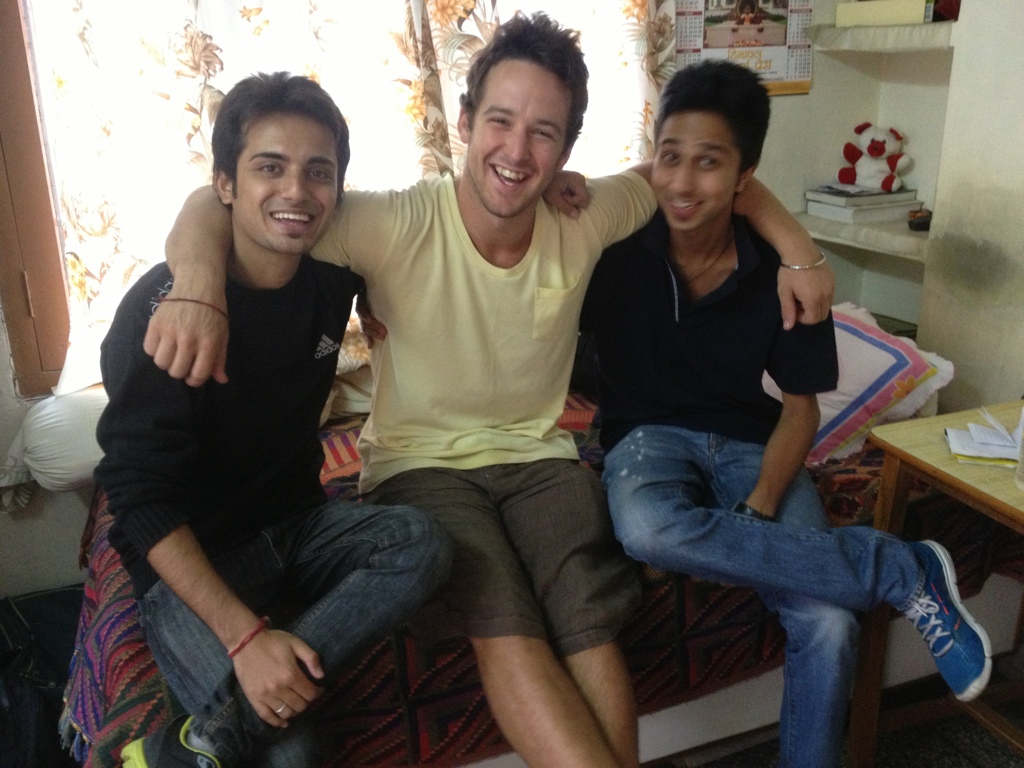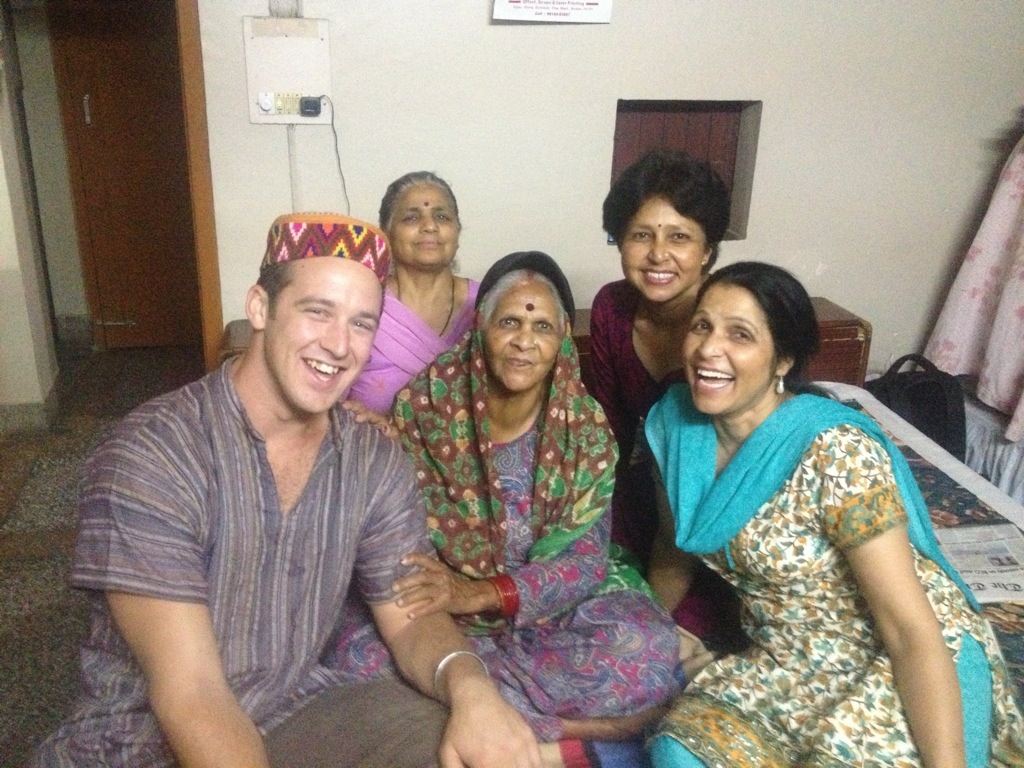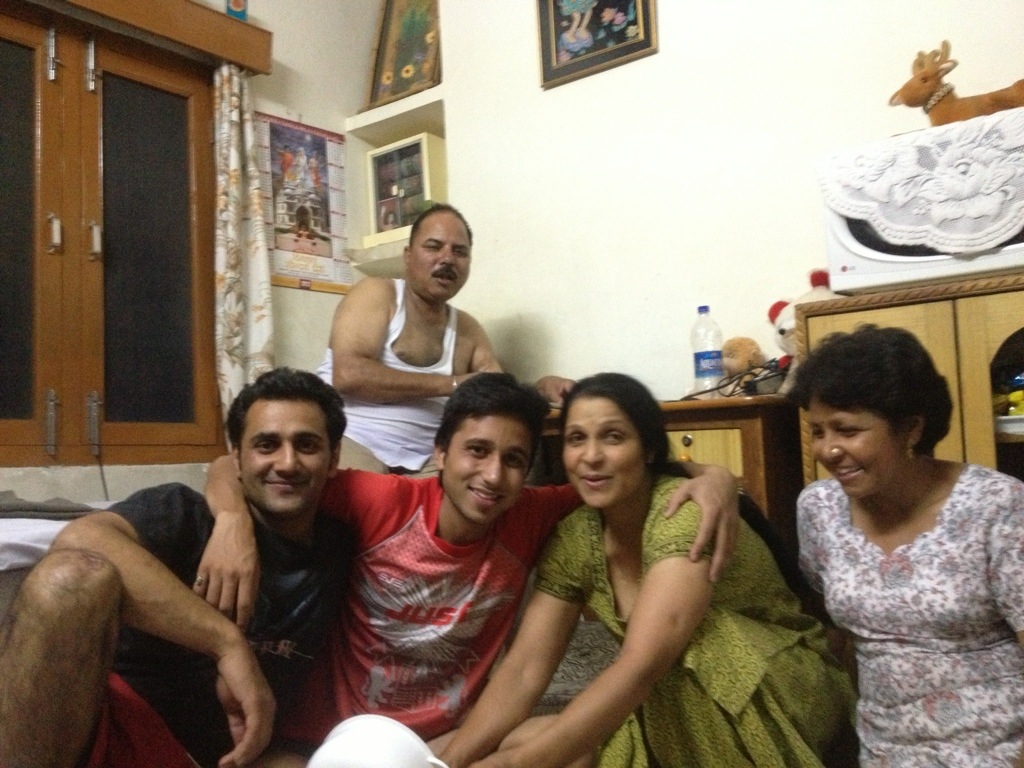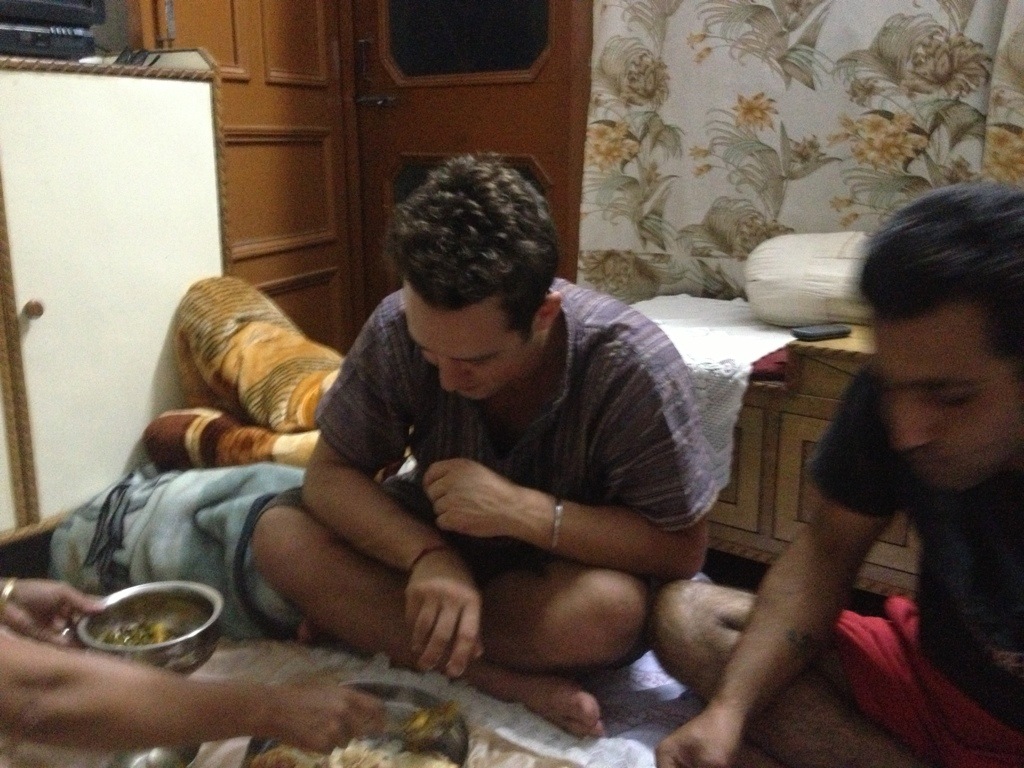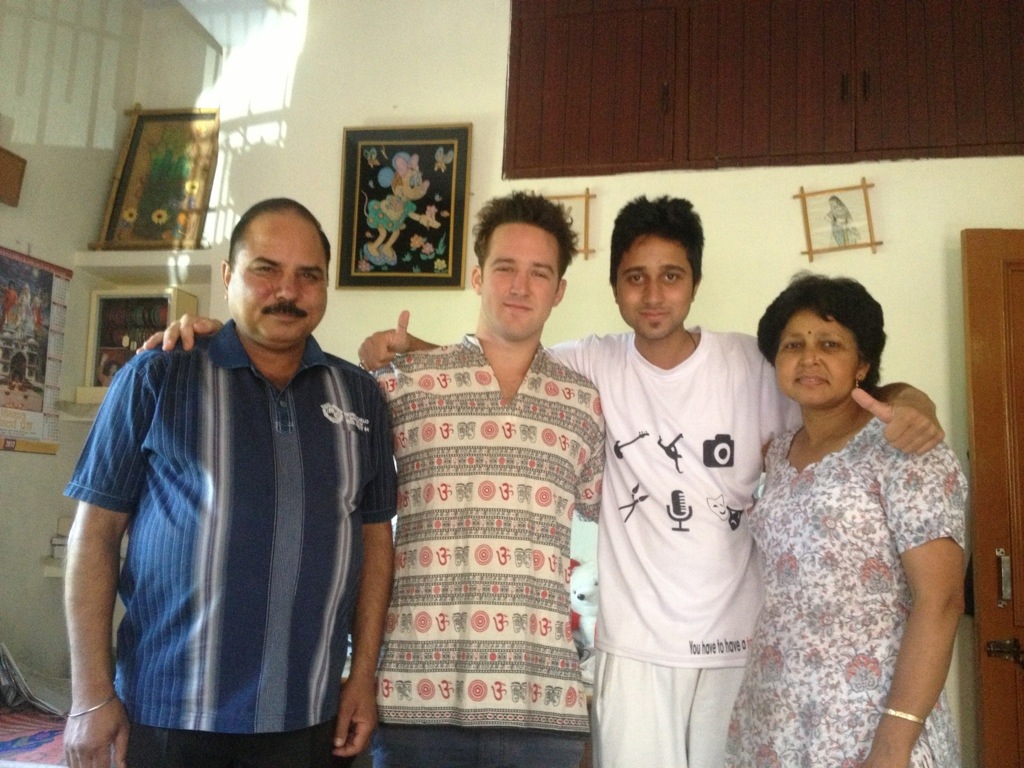Indian Hospitality, Pt I – The Sharma Family
Let me take you back about 8 weeks now, to my last actual diary-style blog post, where I was in Shimla and I had just met Abhinandan (it means ‘welcomer’ in Hindi, Abhi for short), we’d been for a few drinks and he had invited me to come and spend some time with his family. An invitation I gratefully, if a little hesitantly (the 3 large bottles Kingfisher Strong helped with that), accepted.
It was raining when I woke up the next morning, so I text Abhi and told him I’d hang on for the rain to stop before heading over. By the time the clouds had parted of the Shimla ridge, it was about 2pm and I trudged down to the local old bus station with my 20kg worth of things I don’t need to be carrying around with me. At the old bus station, I wandered around looking lost like usual until a young lad came up and asked if he could help me. I said I was going to Solan and he told me I needed to get to the new bus station, which he was headed for too. We (he) found the bus and we climbed aboard together, the bus beginning to move as my first foot hit the bottom step. Woah! Once the ticket inspector had clambered over everybody to the back of the bus to take our 5 rupee fare, my new friend ‘Buddy’ (and who says India isn’t becoming more westernised? Oh yeah, no one) paid for me. When we arrived at the station, Buddy showed me to my bus and sat with me until it was time to leave. Shook my hand, strangely enough didn’t ask for a photograph, and left.
I asked Abhi at some point later why every town seems to have an old and new bus station. He said that in India they have a phrase – dēkhēṅgē (pronounced day-klinger) – which means “we’ll see”. So, in other words, when they built the old bus station, they didn’t have enough foresight to consider the possible need for an upgraded one in a few years time. Live in the moment, if someone suggests something that may exist more than three of four minutes ahead – dēkhēṅgē!
Solan, Abhi’s hometown (although, by all accounts, his heart lies in Shimla), was an hour by bus along the mountainous roads, and by the time I arrived the weather was torrential once again. On the bus, I had been befriended by a guy of similar age to me, who was studying to become a doctor. We chatted for a little while, although with his accent and the constant rattle of rusting, metal parts, I found it very difficult to understand what he was saying to me, and afterwards he asked if he could add me on Facebook (or FB as it is known in India). You can look him up (Bhupender Sharma) – he still messages me everytime I go onto Facebook to say hi, although we didn’t exchange much more than that that day on the bus!
Abhi was waiting for me at the bus stop in is Dad’s car and drove me home in true Indian style – overtaking, honking and taking is eyes off the road for a considerable amount of time whenever he sees a female pedestrian – back to his home to meet his mother, Rama.
Rama is an English teacher at the local high school and, despite this, seriously struggles to understand me. (Although saying that, most Americans I meet can’t understand me, so maybe it’s me.) But we get on famously with the aid of Abhi’s translations. I learned at this point that whilst Abhi had picked up most of his English language at school, he learnt the rest from watching WWE Wrestling and Enrique Englesias videos. Apparently, Enrique Englesias passes for cool these days in India, whereas having photos of your family on Facebook is social suicide (I’ll come on to that).
Rama makes the greatest cup of Chai (tea, all cooked up in a kettle (milk included) with masala (spices) such as cardamom) I’ve ever had, and she’s delighted at my reaction to it. From that moment on, I didn’t go half an hour without being offered another cup!
Abhi’s family live in a first floor flat in a block of three floors. The house consists of a bathroom, kitchen and two bedrooms (one doubling up as dining and living room, and the other as a study and alternative dining and living room depending upon how many people are in the house). Whilst their house is modest, Abhi’s family are certainly middle class Indians. His dad is a successful sales manager, travelling around northern India selling an oil product of some kind, his mother is a college-educated English teacher, they own a car and a computer and Abhi is studying to become an electrical engineer at a university in Punjab, completely funded by his parents. It is considered extremely embarrassing for a student to take a job whilst studying as any jobs they are qualified for would generally be taken by people of a lower (yeah, I’m going to say it!) caste.
Whilst the caste system is something that the Indian government have tried to phase out and make less of a deal, it is still a part of everyday Indian culture, just like the dowry at weddings.
I stayed with Abhi’s family for 2 nights. On the day of my arrival, Abhi took me around Solan and we went and got some beers before dinner. When we got home Abhi’s dad, Devindra, was waiting for us and greeted me with a handshake and big friendly grin. Everyone is delighted to have a gora to stay! And on the second day we went to a Hindu Mundun ceremony, which is when a baby’s head is shaved shortly after birth – a christening ritual for Hindus, I suppose – and then was taken down the side of a mountain to see the Mohan Shakti National Heritage Park.
This national park is owned by the founding family of Mohan Meakin, Asia’s first brewery, based in Solan. Mr Mohan has made an attempt to build what can only be considered as a Hindu heaven on earth. It is in one of the most spectacular settings in northern India, nestled in a valley between mountains, and the building is vast and built from white marble. Inside, you find statutes of nearly all the major Hindu gods (a small selection of the 37 crore (370,000,000) gods the Hindu faith claims). The park is still being developed with acres more of Hindu heaven planned. No doubt this place will be a big tourist spot when it is finished.
Another good quote from Abhi on that “37 crore gods” fact – he said “if we have 37 crore gods and the Britishers only have 1, what good is it having lots of gods?” A fair point, I suppose.
After the second night, we had a late breakfast and Abhi and I jumped on the bus to Chandigarh, where I would spend one more night with the wonderful Yash and Usha and he would get a connecting bus to Jalander to go back to university for two weeks more of study. Abhi and I parted and I confirmed my (drunken) promise to return in a couple of weeks to meet him and all his friends.
Once again, I was received with great kindness at Yash and Usha’s house. We sat and had some beers in the garden, I was force fed lots of excellent local-style food and I was sent to bed unable to lie face down. The next day, Yash helped me work out the buses for my onward trip to Rishikesh, and I sadly left them again.
As soon as I got to Rishikesh, I met some awesome people and spent about two weeks with them. We went from Rishikesh, back to Manali, where I left them and returned to Solan. But I’ll tell you about them another time.
I’d be lying if at this point I said I wasn’t having a moral dilemma. I was having a great time with the guys I’d met (the ‘Rishikesh 9′ as someone christened us) and I didn’t want to leave them, but I’d promised Abhi that I’d return to Solan and spend some more time with him. There was also this nagging feeling that I should be seeing more of India, not returning to places I’d already been. But then again, in my opinion, the beauty of India (and admittedly the horrors too) are in it’s people, not its landmarks and its landscapes. So, why see more of India, when I could get to know more Indians – in fact, seeing more Indians surely is inherently seeing more of India, if that last statement is true.
I resolved my dilemma by reminding myself of my travelling resolution (yeah, a bit like that “finding yourself” rubbish that people talk about when you go to India) that I shouldn’t make promises I can’t keep. As I’d already fallen at the first hurdle of not making promises, I resolved that I should keep it, therefore not making it one I couldn’t keep. You might think I’m getting away with that on a technicality, but I don’t care what you think.
Note: I did actually meet someone that used that “find yourself” phrase without any kind of irony whatsoever. She also sang with her eyes shut. Case closed.
I rolled back into Shimla and was met by Abhi and his ‘BFF’ Rohit. Their relationship spare minded me of what a beautiful thing friendship is in this country. These two guys spend every moment that they aren’t at college in each others pockets, they’re staying at each others houses every day during the summer holidays and they speak every single day. Don’t get me wrong, I couldn’t stand it. It’d be horrible. But, maybe that’s how friendship is supposed to be… Until one of them gets married, breaks the other ones heart and he tries to sabotage the marriage, or something like that. Fingers crossed, that won’t happen.
Anyway, we spend the day hanging around Shimla and then take the bus back to Solan. When we reach Abhi’s house, I realise he’s forgotten to mention something. In a house which, to me, seemed kind of crowded with me there, they now have some family staying: two aunts, a grandma and a cousin. That’s four, on top of three permanent residents and Rohit and I – a grand total of 9 people sleeping in a house with one sofa, a double bed and very little floor space.
Soon, Rama has laid out blankets on the floor for the youth, all four of us, shoulder to shoulder, Devendra is asleep on the sofa, and four women between the ages of 40 and 70 are climbing into a double bed together. After our late dinner (Indian families don’t seem to eat until 10pm at the earliest) I soon find myself dozing off.
The next few days consist of meeting lots of Abhi’s friends and seeing lots of the sights around Shimla and Solan, including the Institute of Advanced Studies (once the Britisher’s Viceroy Lodge), the toy train (from Solan to Shimla) and various bars and parks where Abhi and his friends spent their earlier years playing and later drinking, away from the prying eyes of the other 1.2 billion indians who wouldn’t look to keenly on youngsters drinking.
On my last night, Abhi, his cousin and I are in a bar called Ice & Spice on Solan’s high street and we get a call from Devendra asking if we can come and pick him up from another bar on our way home. He doesn’t know that we’re in a bar. Or, at least Abhi thinks that he doesn’t know, but in my experience, parents know everything, especially the things you try and hide from them. When we meet Devendra I ask if we can go back inside so I can buy him a drink. He refuses, but says he’ll buy me one. He’s drinking whisky and coke, and I join him on those. He also buys Abhi and his cousin a beer to share, which Abhi refuses, only sipping it every time his dad gets up or looks away.
Devendra then gives us all a bit of a lecture about being a 21st century man. That includes drinking whenever you want, choosing your own wife and doing a job that you want to do. He doesn’t have much of anything else insightful to say, but I think the take home message for Abhi was “do what you want to do, not what you think other people want you to do, you’re your own man!” Something which Abhi believes wholeheartedly, just not in front of his parents.
We head home and food is waiting for us. I’m told that we are going to eat “Indian-style”, i.e. sitting on the floor, with our hands, in a circle, teaching me some Hindi. It turns out that the key to Indian conversation is two words:
1. Han-ji – yes
2. A-cha – okay
To hold a conversation in Hindi, you just repeat these words on a loop and everyone will assume you know exactly what’s going on. A wonderfully simple language to perfect really.
Eating with your hands turns out to be a lot of fun (although I was quite drunk), you just have to forget what you’re doing and get stuck in. Once you’re over the fact that you have dal up your wrists and rice all over your trousers (everyone else was slightly less messy than me) its a great way to enjoy good food. And it was good food. All the food I ate at Abhi’s was excellent.
Finally, I had to say goodbye to this wonderful family. I had so much fun with them. They accepted me like their own son. I’ve never felt so welcomed so quickly by anybody. It was absolutely astounding. We had one final photo shoot, and i was out the door.
On our way to the bus stop, Rama and I got out of the car and went into a bazaar on Solan high street. She bought me a Himacheli cap to remind me of my time in Solan. Soon, I was on the bus and away back to Chandigarh, to catch my train to Varanasi.
Fast forward a week and I’m at Delhi airport, about to catch my flight to Kuala Lumpur. Delhi airport is pretty high-tech. They have these sleeping pods where you can get a few hours sleep before your flight, all these very modern, western restaurants and 30 minutes free wifi. I thought it’d be the perfect time to upload some India pictures to Facebook. I put about 20 pictures on Facebook featuring Manali, Shimla, Solan, Rishikesh and Chandigarh. Pride of place at the front of this album are my pictures of, and with, Abhi’s family. “I bet very few people have this kind of experience in India” I think to myself as the timer on my free wifi clicks past 29:59 and cuts out.
Moments later, I receive a text from Abhi from my Nokia with my Indian SIM card which has been out of credit for a few days now. “Hi Jack. Thanks for putting those photos up, but can you do me a favour and take down all the ones of my family as soon as possible. Thanks.”
“Oh God,” I think, “I’ve made some terrible cultural faux pas!” My free Internet has run out, and my flight is boarding in 20 minutes from a gate 10 minutes away. I find an information desk, ask them for an Internet cafe and then scurry off in the opposite direction of my gate to find it. I buy 20 minutes of Internet time, the minimum, log onto Facebook and remove any photos with a trace of Abhi’s family. As a bead of sweat drips down my face, I desperately hope I haven’t hurt anyone’s feelings or caused any upset. I write a grovelling message to Abhi apologising, “I’m so sorry” and “I didn’t think to ask” and “in the UK we don’t think twice about that sort of thing.”
And then I’m back off running to my gate, I’m the last one in the gate, I’m really sweating now, and the flight attendant looks a bit disgruntled, following me down the corridor like I’m the last one. At least I managed to avert an international diplomatic crisis though, eh!
I arrive in KL, still concerned about whether I got the photos down in time – hopefully I haven’t caused too much damage! – check into my hostel and log in to the wifi. My iPhone buzzes with a Facebook notification; a few likes an a couple of comments for the India album, and a reply from Abhi which I open nervously:
“Thanks Jack. No, don’t apologise. Us Indian youngsters just think having pictures of our family on Facebook is a bit embarrassing.”
Thanks Abhi. Thanks a bunch.
Part II of this post to follow
